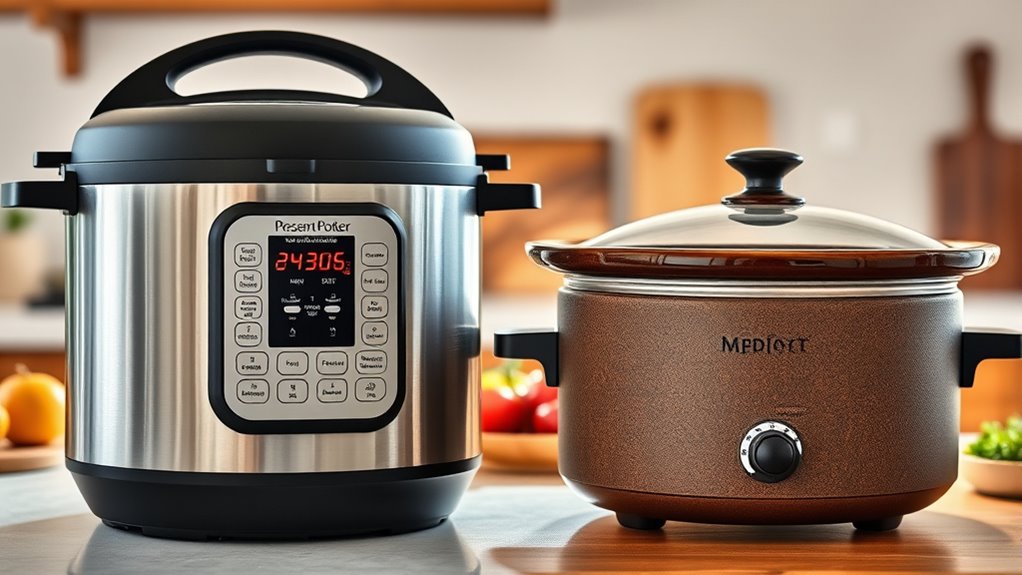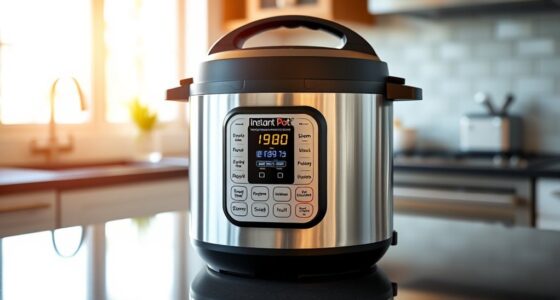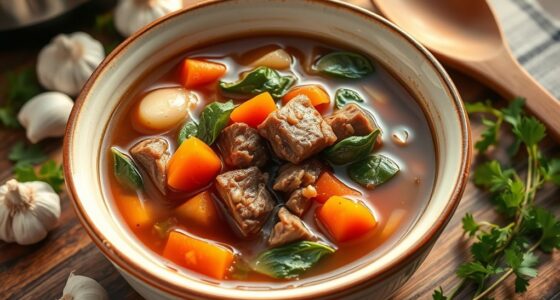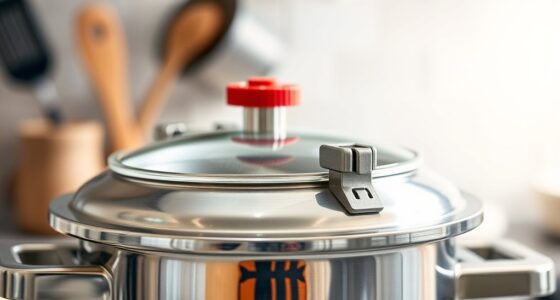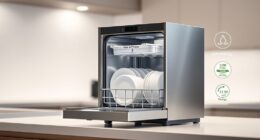A multicooker offers multiple functions like sauté, steam, bake, and pressure cooking, providing versatility in one device. In contrast, a slow cooker is simple, designed mainly for long, unattended simmering to develop rich flavors with minimal effort. If you value quick, varied cooking options, a multicooker is a great choice. But if you prefer easy, low-energy, hands-off meals, a slow cooker might suit you better. Keep exploring to discover which appliance fits your cooking style best.
Key Takeaways
- Slow cookers focus on low-temperature, long-duration cooking for flavors, while multicookers offer multiple functions like sauté, steam, and pressure cooking.
- Multicookers provide versatility and quicker cooking times by switching between modes, unlike slow cookers which are set-and-forget devices.
- Slow cookers are energy-efficient for extended cooking, whereas multicookers reduce overall cooking time and energy use through advanced features.
- Slow cookers have simple controls with limited settings, while multicookers include preset programs for various recipes.
- Choose a slow cooker for convenient, long-term simmering; select a multicooker for versatility and faster meal preparation.
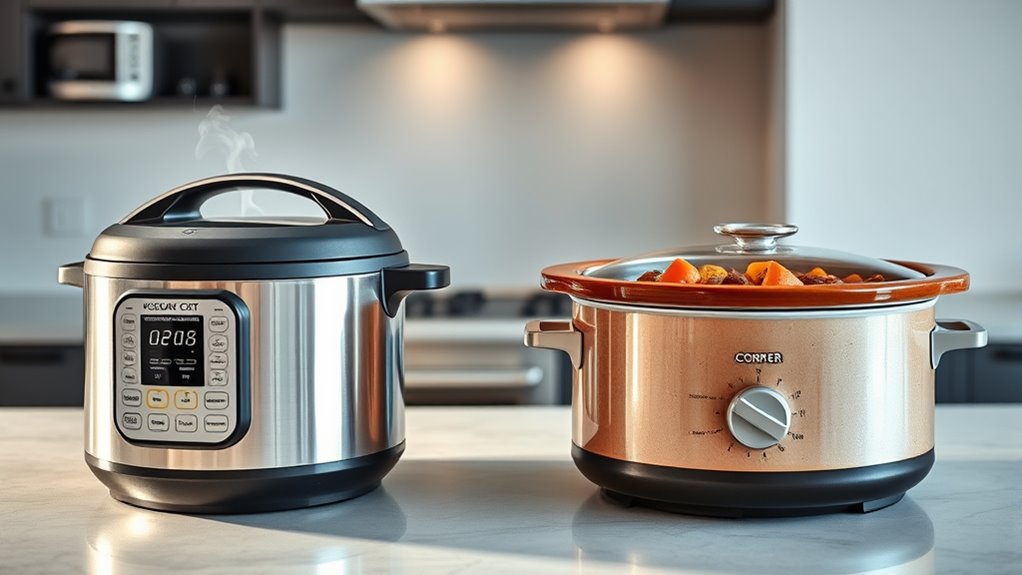
When choosing between a multicooker and a slow cooker, understanding their differences can help you find the right appliance for your cooking style. Both appliances are designed to simplify meal prep, but they serve different needs and offer unique features. A slow cooker is ideal if you want to set it and forget it, simmering dishes over several hours to develop rich flavors. It’s straightforward, typically with just a few temperature settings, and works well for preparing stews, roasts, and soups. If you’re focused on convenience and energy efficiency, a slow cooker consumes less power because it operates at low temperatures for long periods, making it an energy-friendly choice for daily meal prep.
Choosing between a multicooker and a slow cooker depends on your cooking style and needs.
A multicooker, on the other hand, is a versatile powerhouse that combines multiple cooking functions in one device. With a multicooker, you can sauté, steam, bake, slow cook, and even pressure cook, all within the same appliance. This means you can start a dish by browning meat directly in the cooker, then switch to slow cooking or pressure cooking without transferring ingredients to another pot. For busy households that want to streamline meal prep, a multicooker can considerably cut down on cooking time and reduce the number of appliances cluttering your kitchen. Plus, many models come with preset programs, allowing you to choose specific recipes with the push of a button, making meal prep faster and more efficient.
When considering energy efficiency, slow cookers generally use less electricity because they operate at lower temperatures over extended periods. They’re perfect for those who want to save on energy costs while prepping meals in advance. Multicookers, especially pressure cookers, can also be energy-efficient by drastically reducing cooking times for dishes that might otherwise take hours. This not only saves energy but also preserves nutrients and flavors better, making your meals healthier and more flavorful. Additionally, high-tech features in multicookers can optimize energy use and cooking performance, further enhancing their efficiency.
Ultimately, the choice depends on your cooking habits and priorities. If you prefer slow, hands-off meal prep with minimal energy use, a slow cooker could be your best bet. But if you want a multi-functional device that can handle various cooking tasks quickly and efficiently, a multicooker offers unmatched versatility. Both appliances can help you save time and energy, but understanding their core differences ensures you select the one that best fits your kitchen routine.
Frequently Asked Questions
Can a Slow Cooker Replace a Multicooker Entirely?
A slow cooker can’t fully replace a multicooker because they serve different purposes. While a slow cooker offers single appliance versatility focused on slow, low-temperature cooking, a multicooker combines multiple functions like pressure cooking, sautéing, and steaming. The cooking process differences mean a multicooker can handle more diverse recipes efficiently, making it a more versatile choice. So, if you want all-in-one convenience, a multicooker is the better option.
Which Appliance Is More Energy-Efficient for Daily Use?
A slow cooker is generally more energy-efficient for daily use because it consumes less power and has lower energy consumption compared to a multicooker. Its simple design and consistent low heat help save electricity, making it ideal for regular, everyday cooking. If you prioritize power efficiency, sticking with a slow cooker can reduce your energy bills and environmental impact, while still providing delicious, slow-cooked meals.
Are There Specific Recipes Better Suited for One Over the Other?
Imagine a steaming pot bubbling with stew, perfect for slow cookers, which excel at recipe versatility and gentle flavor development. Alternatively, a multicooker’s quick sauté and pressure cooking make it ideal for recipes needing rapid flavor infusion or multiple cooking stages. You’ll find slow cookers better for tender roasts and soups, while multicookers shine with rice, stews, or dishes requiring quick, layered preparation. Choose based on your recipe needs and desired flavor depth.
How Do Cleaning and Maintenance Differ Between the Two?
Cleaning routines for both appliances are straightforward, but maintenance requirements differ slightly. You should unplug the device first, then wash removable parts like the inner pot, lid, and accessories with warm soapy water. Wipe down the exterior with a damp cloth. For a slow cooker, pay extra attention to the heating element, ensuring it’s clean and free of food residue. Regularly inspect seals and cords to keep both appliances in good shape.
Can These Appliances Be Used for Baking or Roasting?
Yes, your multicooker offers baking versatility and roasting capabilities, making it a great all-in-one appliance. You can bake cakes, bread, and even casseroles, while also roasting meats and vegetables. Slow cookers, however, are limited mainly to slow cooking tasks. With a multicooker, you get the added benefit of baking and roasting, so it replaces several kitchen appliances and simplifies your cooking process.
Conclusion
So, whether you choose a multicooker or a slow cooker, remember—you’re the captain of your culinary ship. A multicooker is like a Swiss Army knife, offering versatility and speed, while a slow cooker is your steadfast companion for rich, tender dishes simmered to perfection. The choice is yours, but whichever you pick, you’re crafting delicious meals that tell your story—because in the kitchen, you’re the author, and every dish is a chapter worth savoring.
